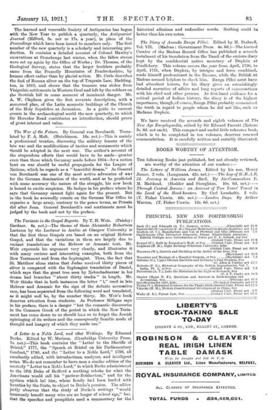The Variants in the Gospel Reports. By T. H. Weir.
(Paisley: Gardner. 6s. net.)—The theme of these Alexander Robertson Lectures by the Lecturer in Arabic at Glasgow University is that the first three Gospels are based on an original Hebrew Gospel, and that the variations in them are largely due to variant translations of the Hebrew or Aramaic text. Mr. Weir expounds his argument very clearly, and illustrates it with many curious and interesting examples, both from the New Testament and from the Septuagint. Thus, the fact that St. Matthew alone states that Judas received thirty pieces of silver is compared with the Septuagint translation of Daniel, which says that the great tree seen by Nebuchadnezzar in his dream had branches " about thirty stadia " in length. Mr. Weir thinks that in both instances the letter "1," used in late Hebrew and Aramaic for the sign of the definite accusative case, has been separated from the following word and translated, as it might well be, by the number thirty. Mr. Weir's book deserves attention from students. As Professor Milligan says in his preface, there is a danger "lest the romantic discoveries in the Common Greek of the period in which the New Testa- ment has come down to us should lead us to forget the Jewish upbringing of its writers and the consequently Semitic mode of thought and imagery of which they made use."






























 Previous page
Previous page